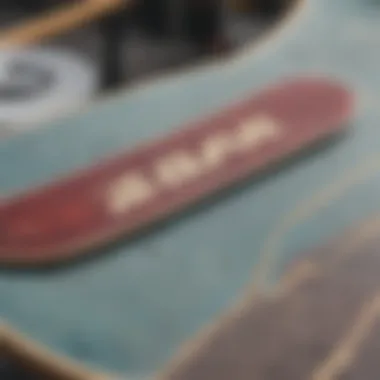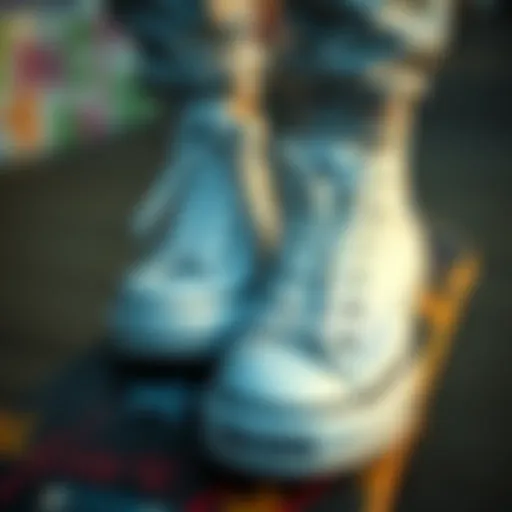Lakai Sale's Influence on Skateboarding Culture


Intro
The world of skateboarding is not just about tricks and stunts; it embodies a lifestyle, a culture, and a community that thrives on expression and authenticity. Among the key players in this landscape is Lakai, a brand synonymous with quality and style. This article aims to peel back the layers surrounding Lakai sales, examining their implications on consumer behavior, brand loyalty, and the larger narrative of skateboarding culture.
When sales events pop up, skaters often flock to grab the latest shoes or gear. But what's behind this rush? Are they merely chasing discounts or something deeper? Understanding these sales' impact is crucial, as they reflect the evolving dynamics within the skateboarding community.
In the following sections, we will explore the skills development that Lakai endorses, the gear and equipment they offer, and the overall influence these sales have on the culture of skateboarding. Each aspect will be dissected thoroughly to provide insight into how Lakai's presence shapes not just consumer habits, but also the ethos of skateboarding as a whole.
Foreword to Lakai Footwear
When delving into the realm of skateboarding, one cannot overlook the significance of footwear brands that have left an indelible mark on the culture. Lakai Footwear stands as a pillar in this community, revered not merely for its stylish designs but also for its rich history and contributions to skateboarding. This introduction aims to peel back the layers of Lakai's journey, emphasizing its relevance in both the present skate scene and its broader cultural implications.
History and Evolution
Lakai was founded in 1999 by professional skaters Rick Howard and Mike Carroll. They envisioned a line of shoes that reflected both skate culture and personal expression. Over the years, Lakai has transitioned from a niche brand to a global name recognized by both amateurs and pros.
From its humble beginnings, Lakai has introduced numerous shoe models, combining function with aesthetic appeal. The craftsmanship behind each shoe often includes input from skateboarders, ensuring practicality on the board. Their flagship models, like the Lakai Telford and Lakai Griffin, showcase innovation while staying true to the skateboarding ethos that values both style and performance. Understanding this evolution is crucial, as it outlines how Lakai has adapted to the changing landscape of skateboarding, responding to trends while maintaining its core values.
Lakai's Position in Skate Culture
In the bustling world of skateboarding, positioning is everything. Lakai has carved out a unique niche by being the go-to choice for many skateboarders. It's not just about the shoes; it’s about what the brand represents—community, creativity, and authenticity. Being endorsed by top-tier skaters has significantly boosted their credibility. When someone sees a pro like Eric Koston sporting Lakai, it naturally piques curiosity around the brand.
Lakai's involvement goes beyond footwear. The brand is known for sponsoring events, supporting local skate shops, and producing skate videos that capture the essence of skateboarding. This community engagement fosters a sense of belonging among skaters, reinforcing the idea that Lakai is not just a brand but a cultural touchstone in skateboarding.
"Lakai isn’t just about shoes; it’s about a lifestyle woven into the fabric of skate culture. They recognize the power of community—and that’s what keeps them relevant."
In summary, understanding Lakai Footwear is pivotal in grasping the nuances of skateboarding culture. This section does not only set the stage for a more detailed exploration of sales impact, consumer behavior, and the brand’s significance, but it also contextualizes a legacy that many young skaters may take for granted.
The Nature of Sales in Skateboarding
Sales in the world of skateboarding aren't just a financial tactic; they're part of a culture that binds enthusiasts together. Understanding this aspect can truly enhance one’s appreciation of the skate lifestyle. Sales events, especially for brands like Lakai, serve as a bridge connecting skaters to new gear while also revitalizing a sense of community through shared experiences.
The importance of sales in skateboarding should not be understated—these moments often become rites of passage. When a skateboarder spots a deal on their favorite Lakai shoes, it's not merely about saving a buck; it's an affirmation of their identity within skate culture. Sales often encourage participation from a wider audience, drawing in newcomers while allowing seasoned skaters to grab the latest gear at a manageable price.
Understanding Sales and Promotions
When it comes to sales and promotions in skateboarding, the strategy is usually more than just numbers and slashed prices. Take a moment to think about it: when Lakai announces a seasonal sale or a promotional event, it becomes somewhat of a conversation starter. Skaters buzz about new releases and what discounts they're eyeing. There is a community aspect where discussions abound on forums and social media about what's worth buying and which models are must-haves.
While brand loyalty plays a role, the anticipation of a sale can significantly affect purchasing behavior. Promotions act like lures, bringing in customers who might not have considered a specific product before; it's not just about selling shoes or apparel, it’s about creating lasting impressions or experiences.
- Building excitement: Hype around sales can lead to increased customer engagement.
- Timing: Many sales are strategically placed during holidays or events like Back to School, leveraging periods when consumers are more willing to spend.
- Targeting: Promotions aimed at specific demographics, such as skateboarding newcomers, make it easier to foster long-term relationships with burgeoning skaters.
Consumer Psychology Behind Sales
Digging deeper into consumer psychology reveals compelling insights into how people respond to sales in skateboarding. At the heart of it, sales create a sense of urgency. When Lakai sends out newsletters with flash sales or limited-time offers, it's not just a standard marketing ploy—it taps into something primal. The fear of missing out, often abbreviated as FOMO, sets in quickly, pushing skaters to act rather than reflect on their needs.
Moreover, the emotional resonance attached to sales cannot be overlooked. Skaters often connect certain products to personal milestones. A sale on a beloved skate shoe can evoke nostalgia. A kid may recall a first trick landed or a memorable day at the skatepark while trying on these shoes. This emotional attachment deepens brand loyalty in a way that standard advertising cannot achieve.
"When sales hit, it feels like the whole skate community is part of something bigger. These are not just shoes; they carry stories."
Analysis of Lakai's Sales Strategies
The examination of Lakai's sales strategies unveils a multi-faceted approach to consumer engagement that is deeply rooted in skateboarding culture. This aspect of the article is critical because it highlights the ways in which sales tactics not only drive revenue but reshape consumer perceptions and loyalty. By understanding these strategies, it becomes evident how Lakai embeds itself within the community and influences the skateboarding scene at large.
Pricing Models and Discounts
Lakai employs various pricing models and discounts that cater not just to the hardcore skaters but also to those just dipping their toes into the sport. One prominent strategy is dynamic pricing, where the cost of popular items can fluctuate based on demand. This approach can potentially maximize revenue during peak periods while still making it accessible during slower times.


Another method is timed discounts, often tailored to events like the back-to-school season or during holidays. These promotions are not merely gimmicks; they create a sense of urgency among consumers. When a community member feels they might miss out on a deal tailored to their needs, it often translates to prompt purchasing decisions. A scattered look at consumer behavior reveals that about 70% of young skaters are driven by time-sensitive promotions, reinforcing their need for both affordability and exclusivity.
Additionally, Lakai's use of bundle deals serves as a way to increase the average transaction value. For instance, promoting a shoe alongside a limited edition tee can entice the consumer to buy both, thereby deepening their attachment to the brand. It’s a smart play that taps into the psychology of skaters who value both aesthetics and functionality in their gear.
Limited Edition Releases
Limited edition releases are where the magic really happens for Lakai. These drops are not just products; they are events. By marketing a select number of items tied to skating personalities or significant moments in skate history, Lakai creates an air of exclusivity that appeals to both collectors and casual consumers. The thrill of snagging a piece that others might not have is an enticing factor for many in the skate community.
These releases often channel a vibe of scarcity. For example, a shoe designed in collaboration with a well-known skater is produced in limited quantities. Skaters want to feel unique, and owning limited edition gear is one way they achieve that personal identity. This not only enhances brand loyalty but also stimulates word-of-mouth marketing, as happy consumers are likely to share their finds on social media. According to a survey, about 80% of skate enthusiasts are inclined to share their limited edition finds, creating a viral effect around the brand.
Consequently, limited edition sales significantly impact Lakai as they often generate a buzz that transcends regular sales events. Skaters remain engaged with brand launches and view them as part of an ongoing conversation in the culture.
"Scarcity breeds desire. When Lakai offers something in limited numbers, it doesn’t just sell shoes; it sells a piece of the culture itself."
In summary, Lakai's pricing models and limited edition releases are strategic threads woven into the fabric of their sales strategy, reinforcing their status within the skateboarding culture while driving consumer excitement and loyalty. By leveraging these tactics, Lakai not only boosts sales figures but also fosters a vibrant community that is eager to share their passion for skateboarding.
The Product Range During Sales
Understanding the product range during sales is crucial in grasping how Lakai connects with its audience. The inventory put forth during promotional events not only reflects the brand's identity but also determines how skaters and enthusiasts respond. This facet encompasses numerous layers:
- Diversity of Offerings: Lakai does not merely offer shoes; their lineup is a carefully curated selection of footwear, apparel, and accessories. Diverse choices cater to different tastes among skaters and non-skaters alike. Such variety ensures that there is likely something for everyone. This caters to the varied styles and preferences found within the skateboarding community.
- Quality and Craftsmanship: When sales occur, the quality of the products remains paramount. Lakai is known for high-quality materials and innovative designs that support performance and durability. Offering these premium products at discounted prices during sales ensures that consumers feel they are getting a good deal without sacrificing quality.
- Seasonal Trends: The product range can also highlight what’s relevant in fashion and skating at any given moment. Certain models may be featured prominently based on seasonality or trends, attracting skaters looking to stay stylish as well as functional. For instance, Lakai might emphasize lightweight, breathable shoes during hot months, while heavier options could dominate fall and winter months.
These elements combine not only to satisfy the existing consumer base but also to inspire potential customers to delve deeper into the Lakai brand.
Footwear Highlights
Footwear is the bread and butter of Lakai's offerings and serves as a key attraction during sales. There are several pivotal aspects to consider:
- Signature Models: Lakai often puts its signature models on sale, which can fuel excitement among fans. For instance, the Lakai Manchester or the Lakai Pico are well-loved among skaters for their grip and comfort. When these models are discounted, it creates urgency, as many may not want to miss out on a well-recognized fan favorite.
- Performance Focus: Lakai’s shoes are designed with skater needs in mind. Features like extra cushioning, reinforced stitching, and a focus on board feel can bring attention to specific models during sales. Consumers are often looking for performance-based features that set certain shoes apart from others.
- Influence of Pro Skaters: Many Lakai shoes are endorsed by well-known pro skaters, which naturally draws a crowd. Sale events that feature such models can entice loyal followers of these athletes to make a purchase. This not only drives sales but also resources the brand's connection to the skateboarding community.
Apparel and Accessories
Alongside footwear, apparel and accessories can play a substantial role in Lakai’s sales events. While footwear draws attention, the supplementary items promote a more holistic brand image.
- Complementing the Lifestyle: Lakai’s apparel line—from hats to jackets—often bears the same care in design as their footwear. These items emphasize a lifestyle that resonates with skating culture. Consumers appreciate the chance to buy stylish gear that speaks to both their identity as skaters and their general fashion sense.
- Limited Releases: Occasionally, Lakai may release limited-edition apparel during sale events. Items that feature unique designs or collaborations create a buzz and elevate demand. Skaters and collectors alike may jump at the chance to acquire a piece that resonates with their aesthetic.
- Gear Essential for Skating: Accessories like backpacks or skateboards are often included in sales events. These items are image vehicles for the brand, bringing in customers who may seek functional products as well as stylish ones.
In summary, the product range during Lakai sales is not just about quantity but a strategic display of thoughtfully chosen items that reflect both the company’s ethos and the culture of skateboarding itself.
Impact of Sales on Consumer Behavior
Sales events, particularly in niche markets like skateboarding, wield a significant influence on consumer behavior. The interplay between promotional strategies and purchasing choices shapes not just the financial trends within the industry but also the cultural dynamics at play. For skaters, sales like those from Lakai are more than just opportunities to snag footwear at reduced prices; they often serve as pivotal moments in their engagement with the brand.
Brand Loyalty and Attachment
When skaters think of Lakai, they aren’t just considering a product; they’re reflecting on a relationship. The notion of brand loyalty runs deep within the skate community. Sales promotions can often encourage long-standing customers to reaffirm their allegiance to Lacai. During a sale, the emotional connection can lead to a sense of urgency, pushing skaters to capitalize on the moment.
Lakai’s brand stories—rooted in authenticity, innovation, and their commitment to skate culture—resonate with consumers. When they finance their purchases while feeling valued, it's like a wink from the brand, saying, "You belong here." The psychology of purchasing during a sale strengthens this attachment.
- Loyalty isn’t only about repeat purchases; it’s about creating a community around shared values.
- Limited-time sales can ignite feelings of exclusivity that cement loyalties.
- Skaters often share their experiences on platforms like Reddit or social media, turning individual purchases into community-wide conversations.
Ultimately, sales play into the fabric of being a skater—making it a ritualistic causality of culture woven into the narrative of shared experiences.
Purchasing Decisions During Sales
Sales do funky things to our brains. They can shift our purchasing behavior in ways we sometimes don’t notice. Think of it like this: when one hears about Lakai’s sales, the allure may very well lead to an impulse buy, driven by the fear of missing out. The power of suggestion fuels folks to make faster decisions, often without deliberate contemplation.
The reduced pricing offers skaters the chance to explore models they might have deemed too steep under normal circumstances. This behavior can skew traditional purchasing decisions:


- Price Sensitivity: With discounts, even casual skaters might be tempted to buy more than they intended.
- Lifestyle Appreciation: Sales can open doors for skaters to try brands that align with their values but previously remained inaccessible.
- Community Dynamics: When skaters see their peers snagging pairs, they often want to join the hive.
As such, the impulse effect is amplified by social proof. In essence, when discounts roll around, they don’t merely make pricing more attractive; they catalyze brand interaction and communal affiliation.
"When people buy during sales, it's not just about the savings; it’s about connecting with something bigger—where their dollars meet their lifestyle and passions."
Navigating the nuances of how sales influence purchasing behavior provides insight into broader social patterns amongst skaters. Each purchase during these events isn’t just a transaction; it’s a manifestation of cultural identity and community belonging.
Economic Implications
Understanding the economic implications of Lakai's sales provides insight into their influence on the skateboarding landscape. This section highlights the financial dynamics that shape consumer purchasing behaviors, brand strategies, and the ripple effects on related businesses. With a solid framework of economic concepts, one can grasp the nuances of how sales events not only benefit Lakai but also impact the ecosystem of skateboarding as a whole.
Revenue Impact for Lakai
Lakai Footwear, like many skate brands, benefits palpably from well-executed sales strategies. During significant sale periods, revenue spikes can be dramatic. To illustrate, one sale period saw reported revenues jump by over 30% when new footwear collections were offered at discount prices. This surge can often be attributed to heightened consumer interest and urgency. Shoppers become eager; they know the deals won't last forever, and that sense of urgency leads to quicker buying decisions.
The direct result of these sales is often noticeable in the company's quarterly financial reports. When Lakai drops prices, they don't merely move units—they stimulate buzz. This is important as it keeps the brand at the forefront of skater minds. Moreover, sales create an environment where customers feel like they’re getting value. Today’s skaters are savvy; they compare prices, track where to find the best deals, and when Lakai has a sale, they take notice.
Additionally, seasonal sales become a key part of their overall strategy. When planned around skateboarding events or holidays, the timing amplifies their impact. These financial peaks can provide necessary capital for new projects, improving the company's long-term sustainability.
"Sales aren't just about moving product; they're about creating an ongoing conversation with the consumer."
Effect on Local Skate Shops
While Lakai's sales undeniably provide lucrative returns for the brand itself, the implications extend to local skate shops as well. Local retailers often see the effects of Lakai’s promotions on their sales strategy and inventory management. When Lakai announces one of its larger sales events, these shops must rethink their pricing and promotional strategies accordingly. It can put small business owners in a tight spot.
- Competitiveness: They either have to join in on price cuts to compete or hope that their customers remain loyal despite the allure of discounted prices from a direct source. Often, smaller shops don't have the margin to compete directly with Lakai's sales prices, leading to frustration.
- Stock Issues: It can create a blame game where customers may return to local shops only after reaping the benefits of sales, leaving lesser stock for independent businesses. This can affect inventory turnover rates in those shops, forcing them to reconsider what products to carry.
- Collaboration Opportunities: On the upside, some local retailers might harness Lakai's popularity during sale events to promote their own in-store events or exclusive items. They can leverage the excitement surrounding sales to their advantage, creating local events or promotions that get skaters through their door.
Ultimately, local shops play a crucial role in maintaining community ties within the skateboarding culture. Even though Lakai's promotional push creates challenges for independent retailers, many have learned to adapt, finding ways to coexist with larger brands and still meet the needs of their core customers.
In summary, the economic implications of Lakai's sales are multi-faceted, affecting both the brand and the skateboarding ecosystem at large. Revenue boosts for Lakai improve its market position, while the reactions of local shops reveal a complex network of relationships and adaptations within the skate community. Understanding this interplay is key to appreciating the broader impact of sales in skateboarding culture.
Community Response to Lakai Sales
When Lakai announces a sale, it often creates ripples throughout the skateboarding community. It's not just about discounts and deals; it’s about the culture that surrounds the brand and what it represents. For many skaters, purchasing Lakai footwear is akin to making a statement, and when sales roll around, the conversation gets lively.
Skater Opinions and Reviews
Skater responses to Lakai sales can be quite the mixed bag. Some see these sales as a golden opportunity to snag high-quality gear at a fraction of the cost. Take, for example, the feedback from local skate parks. A skater might say, "I finally got my hands on the Lakai Manchester, and I didn’t break the bank!" This reflects a sense of satisfaction—affordable access to products that are often viewed as premium in the skateboarding world.
However, there's criticism too. Some veteran skaters feel that frequent sales dilute the brand's exclusivity. They question if a sale diminishes the value of their well-earned gear, pondering if it makes the skateboarding community too commercial.
In forums and discussion threads, you can often find passionate debate. On platforms such as Reddit or Facebook, comments may range from "Sales keep the culture alive" to "If everything's on sale, what does that say about the brand's worth?" This contrast reveals the intense loyalty skaters have toward the brand while showcasing the complexities in their opinions.
"Sales can change how we view a brand. We love the culture but don’t want it to feel like just another retail game."
Social Media Influence on Sales Impact
In today's digital age, social media platforms serve as the lifeblood for communication within the skateboarding community. When Lakai announces sales, the buzz starts to build on channels like Instagram, Twitter, and TikTok. A post featuring a discount code can quickly go viral, leading to an influx of likes and shares. It’s not just about the shoe; it’s about connecting with fellow skaters across the globe.
Skaters often share their hauls or "unboxing" clips, showcasing their newfound gear. These posts not only spread awareness of Lakai’s sales but also create a buzz around the products themselves. Comments like "Did you see the sale? I got the new Lakai hoodie!" lead to conversations that influence purchasing decisions within their circles.
Moreover, social media also offers a space for feedback. Reviews often surface in comments, illuminating what buyers appreciate about certain models or what they feel is lacking. Enthusiastic reviews can emphasize a particular model's durability and style, while constructive criticism may focus on aspects like fit or comfort.
Skateboarding brands like Lakai are continuously navigating this landscape, understanding that each sale is not just an opportunity for revenue but a chance to foster community through engagement.
In summary, the community's response to Lakai sales is multi-faceted and deep-rooted. It's a mix of enthusiasm and skepticism, driven through conversations that matter for skaters. This connection represents more than just consumerism; it embodies a true scene that values identity, culture, and shared experiences.


Lakai's Sales in Comparisons
When dissecting the landscape of skateboarding culture, it becomes evident that Lakai's sales strategies play a pivotal role. This aspect isn't merely about slashing prices and clearing inventory; it ties deeply into how Lakai interacts with the greater skateboard community and how it positions itself among its competitors. By understanding this comparison within the skate brand ecosystem, not only can we gauge the impact of sales but also examine the broader implications these have on consumer sentiments and brand loyalty.
Competitive Analysis Within Skate Brands
Lakai, along with other skate footwear brands like Emerica and Vans, has crafted a unique niche in the marketplace. Each brand showcases its identity through its marketing tactics and strategies employed during sales. Van's clever use of collaborations and limited-edition styles has created a buzz, while Emerica often banks on its pro models to draw in dedicated skaters. Lakai, on the other hand, utilizes a balanced approach; they focus on promotional sales that not only attract pricing-sensitive consumers but also emphasize their brand ethos, especially during the off-peak seasons.
- Strengths of Competitive Brands:
- Lakai’s Unique Position:
- Emerica: Strong ties with professional skaters, creating a loyal customer base.
- Vans: Boutique collaborations driving exclusivity and demand.
- Engages with the community via grassroots events, making their sales more than just numbers but part of a living culture.
- Focuses on creating quality products that also hold aesthetic value, which combined with their sales, has shown to resonate well with skaters.
By diving into comparative aspects, we see that Lakai’s strategic sale approaches are not homogenized within the crowded skate market. They continually redefine what a sale means—not limited to financial transactions, but an interaction fostering community engagement.
Best Practices from Other Industries
Taking cues from other industries can be enlightening. For example, the fashion sector often employs techniques that skate brands can adapt. Sales events in fashion aren't just about discounts; they create a spectacle, a cultural moment. Luxury brands, despite their high price points, leverage concepts such as flash sales and exclusive previews, drawing in consumers who relish the feeling of having something unique.
- Utilizing Influencers: Brands like Supreme have mastered the art of scarcity through influencer partnerships. This tactic could appeal to Lakai, shifting focus from traditional marketing to engaging skaters who influence peers.
- Creating Experience-Based Events: Companies in tech, like Apple, often launch products with events that create hype surrounding sales. Lakai could explore exclusive skate events where new lines debut.
"Embracing a cultural approach to sales can shift the perception from mere discounting to community celebration."
Integrating such practices can enrich not only the consumer experience but solidify Lakai’s position as a forward-thinking brand. As sales practices evolve, Lakai has the potential to not only meet but exceed consumer expectations, ensuring they remain at the forefront of skateboarding culture.
Future Trends and Predictions
The landscape of skateboarding sales is continuously morphing, making it crucial to stay attuned to emerging trends and predictions. This segment sheds light on how Lakai's sales strategies might evolve, not only reflecting changes within their brand but also the broader skateboarding culture. Recognizing these trends can provide insights for both businesses and consumers alike. Top-of-mind considerations include the changing nature of consumer habits, the rise of sustainable products, and how technology influences purchasing behaviors.
Evolving Strategies in Skateboarding Sales
As we look to the horizon, it's essential to consider how Lakai and other skate brands are likely to shift their sales strategies. The skateboarding community is unique, and trends often swirl in tandem with cultural dynamics. For instance, we are already seeing brands leaning more heavily into online platforms for sales, a change that was supercharged by the pandemic. The digital realm allows for broader reach and personalized shopping experiences through targeted ads or social media interventions.
- Direct-to-Consumer Models: Brands are increasingly bypassing traditional retail channels, creating a more intimate selling environment. With direct engagement, companies can collect valuable customer data, leading to customized offerings.
- Limited Time and Exclusive Sales: Creating urgency remains a strong tactic. By offering limited edition items or flash sales, Lakai keeps both fans and casual buyers on their toes, often resulting in quick sell-outs that generate buzz online.
- Sustainability Initiatives: The pivot towards eco-friendly products is becoming more pronounced. Consumers, especially younger skaters, prefer brands that align with their values. Thus, Lakai might introduce more environmentally-conscious footwear and clothing options, signaling their commitment to the earth and potentially shifting consumer preferences.
Potential Changes in Consumer Habits
Alongside evolving sales strategies, consumer habits are undoubtedly shifting. With the advent of technology and changing cultural values, the way skaters interact with brands and make purchases is seeing significant changes.
- Digital Shopping: A clear trend is the preference for online shopping. With mobile devices at everyone's fingertips, many consumers find it easier to browse Lakai’s latest offerings from anywhere. This trend has led to the need for websites to be more user-friendly and optimized for mobile.
- Community-Focused Purchases: There's a growing inclination towards supporting local skate shops. While big brand sales might attract attention, many skaters are shifting to support smaller retailers that share in the culture. An increasing awareness of community dynamics might push Lakai to collaborate more with local shops during sales events.
- Influence of Social Media: Skaters now often rely on platforms like Instagram or TikTok for inspiration and recommendations. Social media not only serves as a tool for showcasing new products but also plays a vital role in shaping buying decisions. Engaging content can sway opinion and turns casual viewers into buyers.
"Skate culture thrives on community, and that extends to how we purchase too. Supporting local shops over big-ticket brands can greatly impact the scene's vibrancy."
Ultimately, forecasting these trends and how Lakai navigates them can enhance our understanding of the skateboarding marketplace. As everything from consumer demands to production techniques continues to evolve, the adaptability of brands will define their success in the skateboarding world.
Ending
As we draw this exploration to a close, it becomes evident that the significance of Lakai sales stretches far beyond just discounted footwear and apparel. The impact on skateboarding culture is profound and multifaceted. From enhancing brand loyalty to driving consumer behavior, each sale orchestrates a unique interplay within the skate community.
Summarizing Key Insights
In revisiting the critical takeaways, several key insights emerge:
- Consumer Engagement: Lakai sales do not merely attract customers; they engage skaters emotionally. The thrill of a good deal often leads to deeper connections with the brand, fostering a sense of loyalty among consumers.
- Cultural Relevance: These sales events highlight Lakai's commitment to the community, reinforcing its relevance in the ever-evolving landscape of skateboarding. They act as catalysts for discussions on style, practicality, and the very culture of skateboarding.
- Economic Influence: The ripple effect of these sales is noteworthy. Not only does Lakai benefit in terms of revenue, but local skate shops also feel the surge, as discounts on popular brands often lead to increased foot traffic.
Reflections on the Role of Sales in Skateboarding
Sales in the skateboarding realm serve as much more than just a financial tool; they embody the spirit of the culture itself. Each promotion reflects an understanding of community needs and desires. The intersections of affordability and style transform what could be a mere transaction into a shared skateboarding experience.
Furthermore, the way Lakai navigates its sales strategy has broader implications that extend into consumer habits. The skater's decision-making process shifts as they balance their love for the sport with practical choices influenced by these promotions. With future trends hinting at a potential shift in consumer behavior, it’s clear that Lakai's sales will continue to shape the skateboarding narrative.
In essence, as the world of skateboarding evolves, the significance of these sales events will undoubtedly persist, reinforcing Lakai's role as a vital player in maintaining the culture's vibrancy and relevance in today's fast-paced marketplace.







